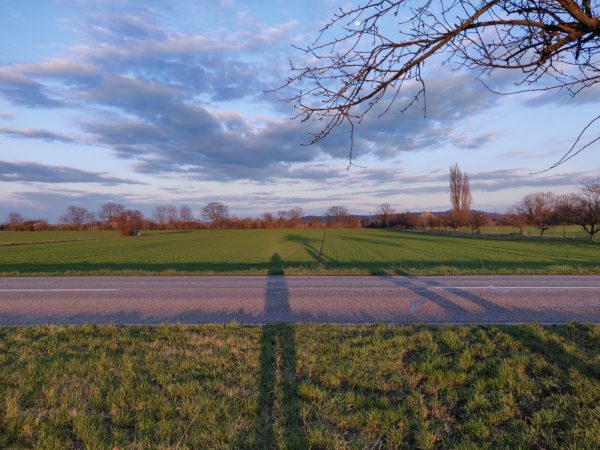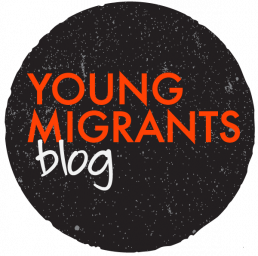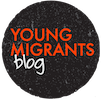
Español
John Michael nació en Venezuela. A los 7 años se muda con sus padres a España en busca de una mejor calidad de vida y a los 21 años llega a Alemania con la finalidad de hacer un Ausbildung en Sachsen-Anhalt; pero el trato a lxs extranjerxs se volvía cada vez más adverso y a los 10 meses renuncia a los estudios para llegar a Berlín. En Berlín está por un periodo de 6 meses, después regresa a España donde experimenta un desarraigo cultural y por tal motivo vuelve a Alemania a trabajar.
John Michael nos habla de los diferentes duelos migratorios en los que él y sus padres enfrentaron, desde la pérdida del estatus social, como la pérdida del acento del idioma, la cultura, su familia y amigxs que fue dejando con el paso del tiempo en los diferentes países a los que ha emigrado. También nos cuenta de las experiencias de discriminación, racismo, ignorancia y machismo en su paso por España y Alemania.
En qué momento el*la inmigrante recibe actos de discriminación o racismo pensando que son actitudes „normales o rutinarios“ y en qué momento sucede al revés? ¿En qué momento un*a inmigrante se vuelve racista con otrxs inmigrantes?
John Michael nos cuenta su experiencia.
La entrevista es en Español por Claudia Serrano.
Deutsch
Auswandern als eine Gewohnheit
John Michael wurde in Venezuela geboren. Im Alter von 7 Jahren zog er mit seinen Eltern nach Spanien, in der Hoffnung auf eine höhere Lebensqualität. Mit 21 Jahren kam er nach Deutschland, um eine Ausbildung in Sachsen-Anhalt zu beginnen; aber die Behandlung von Ausländer*innen wurde immer schlimmer und nach nur 10 Monaten gab er sein Studium auf und zog nach Berlin. Er blieb 6 Monate in Berlin, kehrte dann aber nach Spanien zurück, wo er eine kulturelle Entwurzelung erlebte und deshalb erneut nach Deutschland zurückkehrte, um hier zu arbeiten.
John Michael erzählt uns von einer Migrationstrauer, der er und seine Eltern ausgesetzt waren: vom Verlust des sozialen Status, vom Verlust des Akzents der Sprache, seiner kulturellen Identität, seiner Familie und seiner Freund*innen, die als Resultat seiner stetigen Migration kamen und gingen. Er erzählt uns auch von seinen Erfahrungen mit Diskriminierung, Rassismus, Ignoranz und Machismus, während seiner Zeit in Spanien und Deutschland.
An welchen Punkten erleben Einwander*innen Diskriminierung oder Rassismus, aber hält sie für „normal oder routinemäßig“ und an welchem Punkt geschieht es umgekehrt? Und wann sind Migrant*innen vielleicht rassistisch gegenüber anderen Migrant*innen?
John Michael erzählt uns von seinen Erfahrungen. Das Interview ist in Spanisch von Claudia Serrano geführt worden.
English
Emigrate like a habit
John Michael was born in Venezuela. At the age of 7 he moved with his parents to Spain, in search for a higher quality of life. At 21 he arrived in Germany with the purpose of doing an Ausbildung in Sachsen-Anhalt; but the treatment of foreigners was becoming more and more adverse and after just 10 months he gave up his studies and moved to Berlin. He stayed in Berlin for another 6 months, when he decided to return to Spain, where he experienced a cultural uprooting and therefore returned to Germany again in order to work.
John Michael tells us about his Migratory-Grief, that he and his parents faced: from the loss of social status, the loss of the accent of their language, his cultural identity, his family and his friends, that came and went as a result of his migration. He also tells us about his experiences of discrimination, racism, ignorance and machismo during his time in Spain and Germany.
At what point does the immigrant experience discrimination or racism, and sees them as „normal or routine“, and at what point does it happen the other way around? At what point are migrants maybe themselves racist towards other migrants?
John Michael tells us about his experience. The interview is in Spanish by Claudia Serrano.
© John Michael

